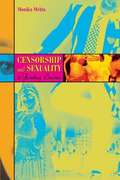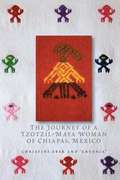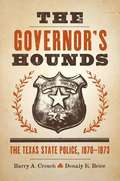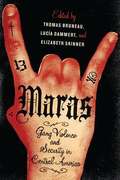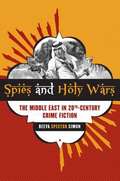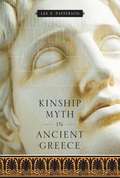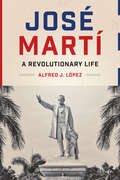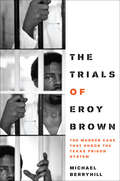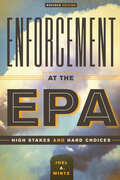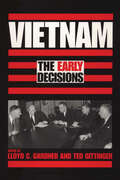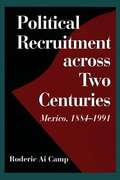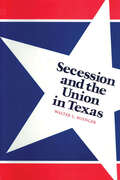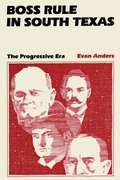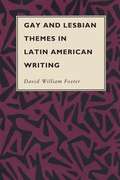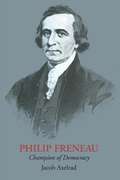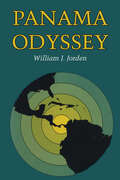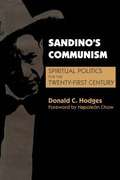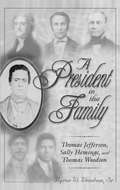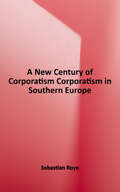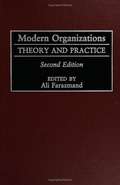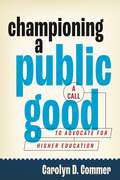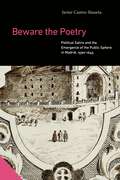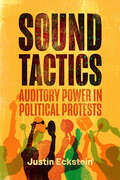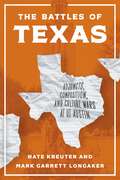- Table View
- List View
Censorship and Sexuality in Bombay Cinema
by Monika MehtaIndia produces an impressive number of films each year in a variety of languages. Here, Monika Mehta breaks new ground by analyzing Hindi films and exploring the censorship of gender and heterosexuality in Bombay cinema. She studies how film censorship on various levels makes the female body and female sexuality pivotal in constructing national identity, not just through the films themselves but also through the heated debates that occur in newspapers and other periodicals. The standard claim is that the state dictates censorship and various prohibitions, but Mehta explores how relationships among the state, the film industry, and the public illuminate censorship's role in identity formation, while also examining how desire, profits, and corruption are generated through the act of censoring. Committed to extending a feminist critique of mass culture in the global south, Mehta situates the story of censorship in a broad social context and traces the intriguing ways in which the heated debates on sexuality in Bombay cinema actually produce the very forms of sexuality they claim to regulate. She imagines afresh the theoretical field of censorship by combining textual analysis, archival research, and qualitative fieldwork. Her analysis reveals how central concepts of film studies, such as stardom, spectacle, genre, and sound, are employed and (re)configured within the ambit of state censorship, thereby expanding the scope of their application and impact.
The Journey of a Tzotzil-Maya Woman of Chiapas, Mexico
by Christine Eber AntoniaMost recent books about Chiapas, Mexico, focus on political conflicts and the indigenous movement for human rights at the macro level. None has explored those conflicts and struggles in-depth through an individual woman's life story. The Journey of a Tzotzil-Maya Woman of Chiapas, Mexico now offers that perspective in one woman's own words. Anthropologist Christine Eber met "Antonia" in 1986 and has followed her life's journey ever since. In this book, they recount Antonia's life story and also reflect on challenges and rewards they have experienced in working together, offering insight into the role of friendship in anthropological research, as well as into the transnational movement of solidarity with the indigenous people of Chiapas that began with the Zapatista uprising. Antonia was born in 1962 in San Pedro Chenalhó, a Tzotzil-Maya township in highland Chiapas. Her story begins with memories of childhood and progresses to young adulthood, when Antonia began working with women in her community to form weaving cooperatives while also becoming involved in the Word of God, the progressive Catholic movement known elsewhere as Liberation Theology. In 1994, as a wife and mother of six children, she joined a support base for the Zapatista Army of National Liberation. Recounting her experiences in these three interwoven movements, Antonia offers a vivid and nuanced picture of working for social justice while trying to remain true to her people's traditions.
The Governor's Hounds
by Barry A. Crouch Donaly E. BriceIn the tumultuous years following the Civil War, violence and lawlessness plagued the state of Texas, often overwhelming the ability of local law enforcement to maintain order. In response, Reconstruction-era governor Edmund J. Davis created a state-wide police force that could be mobilized whenever and wherever local authorities were unable or unwilling to control lawlessness. During its three years (1870-1873) of existence, however, the Texas State Police was reviled as an arm of the Radical Republican party and widely condemned for being oppressive, arrogant, staffed with criminals and African Americans, and expensive to maintain, as well as for enforcing the new and unpopular laws that protected the rights of freed slaves. Drawing extensively on the wealth of previously untouched records in the Texas State Archives, as well as other contemporary sources, Barry A. Crouch and Donaly E. Brice here offer the first major objective assessment of the Texas State Police and its role in maintaining law and order in Reconstruction Texas. Examining the activities of the force throughout its tenure and across the state, the authors find that the Texas State Police actually did much to solve the problem of violence in a largely lawless state. While acknowledging that much of the criticism the agency received was merited, the authors make a convincing case that the state police performed many of the same duties that the Texas Rangers later assumed and fulfilled the same need for a mobile, statewide law enforcement agency.
Maras
by Elizabeth Skinner Thomas Bruneau Lucéa DammertSensational headlines have publicized the drug trafficking, brutal violence, and other organized crime elements associated with Central America's mara gangs, but there have been few clear-eyed analyses of the history, hierarchies, and future of the mara phenomenon. The first book to look specifically at the Central American gang problem by drawing on the perspectives of researchers from different disciplinary backgrounds, Maras: Gang Violence and Security in Central America provides much-needed insight. These essays trace the development of the gangs, from Mara Salvatrucha to the 18th Street Gang, in Los Angeles and their spread to El Salvador, Honduras, Guatemala, and Nicaragua as the result of members' deportation to Central America; there, they account for high homicide rates and threaten the democratic stability of the region. With expertise in areas ranging from political science to law enforcement and human rights, the contributors also explore the spread of mara violence in the United States. Their findings comprise a complete documentation that spans sexualized violence, case studies of individual gangs, economic factors, varied responses to gang violence, the use of intelligence gathering, the limits of state power, and the role of policy makers. Raising crucial questions for a wide readership, these essays are sure to spark productive international dialogues.
Spies and Holy Wars: The Middle East in 20th-Century Crime Fiction
by Simon Reeva SpectorIlluminating a powerful intersection between popular culture and global politics, Spies and Holy Wars draws on a sampling of more than eight hundred British and American thrillers that are propelled by the theme of jihad--an Islamic holy war or crusade against the West. Published over the past century, the books in this expansive study encompass spy novels and crime fiction, illustrating new connections between these genres and Western imperialism. Demonstrating the social implications of the popularity of such books, Reeva Spector Simon covers how the Middle Eastern villain evolved from being the malleable victim before World War II to the international, techno-savvy figure in today's crime novels. She explores the impact of James Bond, pulp fiction, and comic books and also analyzes the ways in which world events shaped the genre, particularly in recent years. Worldwide terrorism and economic domination prevail as the most common sources of narrative tension in these works, while military "tech novels" restored the prestige of the American hero in the wake of post-Vietnam skepticism. Moving beyond stereotypes, Simon examines the relationships between publishing trends, political trends and popular culture at large--giving voice to the previously unexamined truths that emerge from these provocative page-turners.
Kinship Myth in Ancient Greece
by Lee E. PattersonIn ancient Greece, interstate relations, such as in the formation of alliances, calls for assistance, exchanges of citizenship, and territorial conquest, were often grounded in mythical kinship. In these cases, the common ancestor was most often a legendary figure from whom both communities claimed descent. In this detailed study, Lee E. Patterson elevates the current state of research on kinship myth to a consideration of the role it plays in the construction of political and cultural identity. He draws examples both from the literary and epigraphical records and shows the fundamental difference between the two. He also expands his study into the question of Greek credulity--how much of these founding myths did they actually believe, and how much was just a useful fiction for diplomatic relations? Of central importance is the authority the Greeks gave to myth, whether to elaborate narratives or to a simple acknowledgment of an ancestor. Most Greeks could readily accept ties of interstate kinship even when local origin narratives could not be reconciled smoothly or when myths used to explain the link between communities were only "discovered" upon the actual occasion of diplomacy, because such claims had been given authority in the collective memory of the Greeks.
José Martí: A Revolutionary Life (Joe R. and Teresa Lozano Long Series in Latin American and Latino Art and Culture) (Joe R. and Teresa Lozano Long Series in Latin American and Latino Art and Culture)
by Alfred J. López&“The one and only book that treats the nineteenth-century Cuban figure José Martí as a human instead of an idol, an apostle, or an unblemished personality.&” —Tom Miller, author of Revenge of the Saguaro José Martí (1853–1895) was the founding hero of Cuban independence. In all of modern Latin American history, arguably only the &“Great Liberator&” Simón Bolívar rivals Martí in stature and legacy. Today he is revered by both the Castro regime and the Cuban exile community, whose shared veneration of the &“apostle&” of freedom has led to his virtual apotheosis as a national saint. In José Martí: A Revolutionary Life, Alfred J. López presents the definitive biography of the Cuban patriot and martyr. Writing from a nonpartisan perspective and drawing on years of research using original Cuban and U.S. sources, including materials never before used in a Martí biography, López strips away generations of mythmaking and portrays Martí as Cuba&’s greatest founding father and one of Latin America&’s literary and political giants, without suppressing his public missteps and personal flaws. In a lively account that engrosses like a novel, López traces the full arc of Martí&’s eventful life, from his childhood and adolescence in Cuba, to his first exile and subsequent life in Spain, Mexico City, and Guatemala, through his mature revolutionary period in New York City and much-mythologized death in Cuba on the battlefield at Dos Ríos. The first major biography of Martí in over half a century and the first ever in English, José Martí is the most substantial examination of Martí&’s life and work ever published. &“The life, the history and the facts are all here in López&’s volume.&” —The Washington Post
The Trials of Eroy Brown: The Murder Case That Shook the Texas Prison System (Jack and Doris Smothers Series in Texas History, Life, and Culture)
by Michael Berryhill&“Berryhill&’s account of this infamous 30-year-old murder case . . . Provides a jarring portrait of a once-medieval state prison.&” —Publishers Weekly In April 1981, two white Texas prison officials died at the hands of a black inmate at the Ellis prison farm near Huntsville. Warden Wallace Pack and farm manager Billy Moore were the highest-ranking Texas prison officials ever to die in the line of duty. The warden was drowned face down in a ditch. The farm manager was shot once in the head with the warden&’s gun. The man who admitted to killing them, a burglar and robber named Eroy Brown, surrendered meekly, claiming self-defense. In any other era of Texas prison history, Brown&’s fate would have seemed certain: execution. But in 1980, federal judge William Wayne Justice had issued a sweeping civil rights ruling in which he found that prison officials had systematically and often brutally violated the rights of Texas inmates. In the light of that landmark prison civil rights case, Ruiz v. Estelle, Brown had a chance of being believed. The Trials of Eroy Brown, the first book devoted to Brown&’s astonishing defense, is based on trial documents, exhibits, and journalistic accounts of Brown&’s three trials, which ended in his acquittal. Michael Berryhill presents Brown&’s story in his own words, set against the backdrop of the chilling plantation mentality of Texas prisons. Brown&’s attorneys—Craig Washington, Bill Habern, and Tim Sloan—undertook heroic strategies to defend him, even when the state refused to pay their fees. The Trials of Eroy Brown tells a landmark story of prison civil rights and the collapse of Jim Crow justice in Texas.
Enforcement at the EPA: High Stakes and Hard Choices, Revised Edition
by Joel A. MintzThe only published work that treats the historical evolution of EPA enforcement, this book provides a candid inside glimpse of a crucial aspect of the work of an important federal agency. Based on 190 personal interviews with present and former enforcement officials at EPA, the U.S. Department of Justice, and key congressional staff members—along with extensive research among EPA documents and secondary sources—the book vividly recounts the often tumultuous history of EPA’s enforcement program. It also analyzes some important questions regarding EPA’s institutional relationships and the Agency’s working environment. This revised and updated edition adds substantial new chapters examining EPA enforcement during the Clinton and George W. Bush administrations. Its treatment of issues of civil service decline and the applicability of captive agency theory is also new and original.
Vietnam: The Early Decisions
by Lloyd C. Gardner and Ted GittingerThis anthology examines the turmoil and conflicting advice that led the US into Vietnam and the roles played by Presidents Kennedy and Johnson. For many Americans, Oliver Stone&’s film JFK left no doubt that before his assassination Kennedy had determined to quit Vietnam. Yet the historical record offers a more complex view. In this fresh look at the archival evidence, noted scholars take up the challenge to provide us with their conclusions about the early decisions that put the United States on the path to the greatest American tragedy since the Civil War. The book is divided into four sections. Parts one and two delve into the political and military contexts of the early decisions. Part three raises the intriguing questions of Kennedy&’s and Johnson's roles in the conflict, particularly the thorny issue of whether Kennedy did, in fact, intend to withdraw from Vietnam and whether Johnson reversed that policy. Part four reveals an uncanny parallel between early Soviet policy toward Hanoi and US policy toward Saigon.
Political Recruitment across Two Centuries: Mexico, 1884-1991
by Roderic Ai CampDuring more than twenty years of field research, Roderic Ai Camp built a monumental database of biographical information on more than 3,000 leading national figures in Mexico. In this major contribution to Mexican political history, he draws on that database to present a definitive account of the paths to power Mexican political leaders pursued during the period 1884 to 1992. Camp's research clarifies the patterns of political recruitment in Mexico, showing the consequences of choosing one group over another. It calls into question numerous traditional assumptions, including that upward political mobility was a cause of the Mexican Revolution of 1910. Comparing Mexican practices with those in several East Asian countries also allows Camp to question many of the tenets of political recruitment theory. His book will be of interest to students not only of Mexican politics but also of history, comparative politics, political leadership, and Third World development.
Secession and the Union in Texas
by Walter L. BuengerIn 1845 Texans voted overwhelmingly to join the Union. They voted just as overwhelmingly to secede in 1861. The story of why and how that happened is filled with colorful characters, such as the aged Sam Houston, and with the southwestern flavor of raiding Comanches, German opponents of slavery, and a border with Mexico. Texas was unique among the seceding states because of its ambivalence toward secession. Yet for all its uniqueness the story of the secession of Texas has broad implications for the secession movement in general. Despite the local color and the southwestern nature of the state, Texas was more southern than western in 1860. Texans supported the Union or insisted upon secession for reasons common to the South and to the whole nation. Most Texans in 1860 were recent immigrants from southern and border states. They still thought and acted like citizens of their former states. The newness of Texas then makes it a particularly appropriate place from which to draw conclusions about the entire secession movement. Secession and the Union in Texas is both a narrative of secession in Texas and a case study of the causes of secession in a southern state. Politics play a key role in this history, but politics broadly defined to include the influence of culture, partisanship, ideology, and self-interest. As any study of a mass movement carried out in tense circumstances must be, this is social history as well as political history. It is a study of public hysteria, the pressure for consensus, and the vanishing of a political process in which rational debate about secession and the Union could take place. Although relying primarily on traditional sources such as manuscript collections and newspapers, a particularly rich source for this study, the author also uses election returns, population shifts over the course of the 1850s, and the breakdown of population within Texas counties to provide a balanced approach. These sources indicate that Texans were not simply secessionists or unionists. At the end of 1860 Texans ranged from ardent secessionists to equally passionate supporters of the Union. But the majority fell in between these two extremes, creating an atmosphere of ambivalence toward secession which was not erased even by the war. In 1845 Texans voted overwhelmingly to join the Union. They voted just as overwhelmingly to secede in 1861. The story of why and how that happened is filled with colorful characters, such as the aged Sam Houston, and with the southwestern flavor of raiding Comanches, German opponents of slavery, and a border with Mexico. Texas was unique among the seceding states because of its ambivalence toward secession. Yet for all its uniqueness the story of the secession of Texas has broad implications for the secession movement in general. Despite the local color and the southwestern nature of the state, Texas was more southern than western in 1860. Texans supported the Union or insisted upon secession for reasons common to the South and to the whole nation. Most Texans in 1860 were recent immigrants from southern and border states. They still thought and acted like citizens of their former states. The newness of Texas then makes it a particularly appropriate place from which to draw conclusions about the entire secession movement. Secession and the Union in Texas is both a narrative of secession in Texas and a case study of the causes of secession in a southern state. Politics play a key role in this history, but politics broadly defined to include the influence of culture, partisanship, ideology, and self-interest. As any study of a mass movement carried out in tense circumstances must be, this is social history as well as political history. It is a study of public hysteria, the pressure for consensus, and the vanishing of a political process in which rational debate about secession and the Union could take place. Although relying primarily on traditional sources such as manuscript collections and newspapers, a particularly rich source for this study, the author a...
Boss Rule in South Texas: The Progressive Era
by Evan AndersFour men played leading roles in the political drama that unfolded in South Texas during the first decades of this century:- James B. Wells, who ruled as boss of Cameron County and served as leading conservative spokesman of the Democratic Party in Texas;- Archer (Archie) Parr, whose ruthless tactics and misuse of public funds in Duval County established him as one of the most notoriously corrupt politicians in Texas history;- Manuel Guerra, Mexican American rancher and merchant whose domination of Starr County mirrored the rule of his Anglo counterparts in the border region;- John Nance Garner, who served the interests of these bosses of South Texas as he set forth on the road that would lead him to the United States vice-presidency. Evan Anders' Boss Rule in South Texas tells the story of these men and the county rings they shaped in South Texas during the Progressive Era. Power was the byword of the bosses of the Lower Rio Grande Valley, and Anders explores the sources of that power. These politicos did not shirk from using corrupt and even violent means to attain their goals, but Anders demonstrates that their keen sensitivity to the needs of their diverse constituency was key to their long-term success. Patronage and other political services were their lifeblood, and the allies gained by these ranged from developers and businessmen to ranchers and Mexican Americans, wealthy and poor. Besides examining the workings of the Democratic machines of four South Texas counties, Anders explores the role of the Hispanic populace in shaping the politics of the border region, the economic development of the Lower Rio Grande Valley and its political repercussions, the emergence and nature of progressive movements at both local and state levels, and the part played by the Texas Rangers in supporting bossism in South Texas.
Gay and Lesbian Themes in Latin American Writing
by David William FosterA taboo subject in many cultures, homosexuality has been traditionally repressed in Latin America, both as a way of life and as a subject for literature. Yet numerous writers have attempted to break the cultural silence surrounding homosexuality, using various strategies to overtly or covertly discuss lesbian and gay themes. In this study, David William Foster examines more than two dozen texts that deal with gay and lesbian topics, drawing from them significant insights into the relationship between homosexuality and society in different Latin American countries and time periods. <P> Foster's study includes works both sympathetic and antagonistic to homosexuality, showing the range of opinion on this topic. The preponderance of his examples come from Argentina, Brazil, and Mexico, countries with historically active gay communities, although he also includes material on other countries. Noteworthy among the authors covered are Reinaldo Arenas, Adolfo Caminha, Isaac Chocron, Jose Donoso, Sylvia Molloy, Alejandra Pizarnik, and Luis Zapata. <P> David William Foster is Regents' Professor of Spanish at Arizona State University.
Philip Freneau: Champion of Democracy
by Jacob AxelradPhilip Freneau was a poet, editor, and mariner. A graduate of Princeton, he was the roommate of James Madison and a classmate of Hugh Henry Brackenridge and Aaron Burr. When the colonies rebelled against England, he supported his newly born nation as a privateer, spending some time in a British prison as a result. He also served, more effectively, as "the poet of the Revolution. " Later he became the journalistic voice of the democrats. Ardently devoted to liberty, he believed himself to be a defender of the common man, for whom he fought selflessly and often vitriolicly throughout his life. In newspapers such as The Freeman's Journal, The New York Daily Advertiser, The National Gazette, The Jersey Chronicle, and The Time-Piece, he published articles, letters, and poems, instructing the citizens of the new Republic about their rights, and attacking those who, he believed, were infringing on those rights. In the midst of the controversy in which he was so often involved, he also found time to write a small body of poetry whose sensitivity and beauty mark him as the poetic equal of his European contemporaries, and, in fact, as a precursor of the new Romantic movement. In Philip Freneau: Champion of Democracy Jacob Axelrad provides a detailed biography of this pensman of the Revolution and early Republic. He gives a sympathetic, imaginative, perceptive, yet objective interpretation of Freneau and his place in history, and at the same time he presents a delightfully readable and clear picture of the period during which the poet lived. These pages not only re-create the battles between Whig and Tory, federalist and democrat, but they also are alive with the activities and philosophies of the men who made American history. James Madison, Thomas Jefferson, Alexander Hamilton, George Washington, John Adams, James Monroe go about the business of creating and shaping a new country, and as they do, they move into and out of the life of the poet of Monmouth, influencing him in a variety of ways. Above all, Axelrad brings to life for the reader the man Freneau: simple, direct, often uncritical in his devotion to the cause he believed in; courageous in sustaining his stand against strong opposition; disillusioned and pessimistic about human nature, yet boldly optimistic about the future of humanity and of his country. And always behind the furor the reader is aware of the man struggling to provide a living for himself and his family, and never quite succeeding.
Panama Odyssey
by William J. JordenThe Panama Canal Treaties of 1977 were the most significant foreign policy achievement of the Carter administration. Most Latin American nations had regarded the 1903 treaty and its later minor modifications as vestiges of "American colonialism" and obstacles to any long-term, stable relationship with the United States. Hence, at a time when conflicts were mushrooming in Central America, the significance of the new Panama treaties cannot be overestimated. Former Ambassador to Panama William J. Jorden has provided the definitive account of the long and often contentious negotiations that produced those treaties. It is a vividly written reconstruction of the complicated process that began in 1964 and ended with ratification of the new pacts in 1978. Based on his personal involvement behind the scenes in the White House (1972–1974) and in the United States Embassy in Panama (1974–1978), Jorden has produced a unique living history. Access to documents and the personalities of both governments and, equally important, Jorden's personal recollections of participants on both sides make this historical study an incomparable document of U. S. foreign relations. Beyond the singular story of the treaties themselves—and how diplomats negotiate in the modern world—is the rare description of how the United States deals with a major foreign policy problem. How does a superpower cope with a tiny nation that happens to occupy a strategically critical position? And how does the U. S. Senate face up to its constitutionally assigned power to "advise and consent"? Once treaties are approved, does the House of Representatives help or hinder? Panama Odyssey also deals with another crucial element in the shaping of policy—public opinion: how is it informed or led astray? In sum, this is a history, a handbook on diplomacy, a course in government, and a revelation of foreign policy in action, all based on a fascinating and controversial episode in the U. S. experience.
Sandino's Communism: Spiritual Politics for the Twenty-First Century
by Donald C. HodgesDrawing on previously unknown or unassimilated sources, Donald C. Hodges here presents an entirely new interpretation of the politics and philosophy of Augusto C. Sandino, the intellectual progenitor of Nicaragua's Sandinista revolution. The first part of the book investigates the political sources of Sandino's thought in the works of Babeuf, Buonarroti, Blanqui, Proudhon, Bakunin, Most, Malatesta, Kropotkin, Ricardo Flores Magón, and Lenin--a mixed legacy of pre-Marxist and non-Marxist authoritarian and libertarian communists. The second half of the study scrutinizes the philosophy of nature and history that Sandino made his own. Hodges delves deeply into this philosophy as the supreme and final expression of Sandino's communism and traces its sources in the Gnostic and millenarian occult undergrounds. This results in a rich study of the ways in which Sandino's revolutionary communism and communist spirituality intersect--a spiritual politics that Hodges presents as more realistic than the communism of Karl Marx. While accepting the current wisdom that Sandino was a Nicaraguan liberal and social reformer, Hodges also makes a persuasive case that Sandino was first and foremost a communist, although neither of the Marxist nor anarchist variety. He argues that Sandino's eclectic communist spirituality was more of an asset than a liability for understanding the human condition, and that his spiritual politics promises to be more relevant than Marxism-Leninism for the twenty-first century. Indeed, Hodges believes that Sandino's holistic communism embraces both deep ecology and feminist spirituality--a finding that is sure to generate lively and productive debate. Drawing on previously unknown or unassimilated sources, Donald C. Hodges here presents an entirely new interpretation of the politics and philosophy of Augusto C. Sandino, the intellectual progenitor of Nicaragua's Sandinista revolution. The first part of the book investigates the political sources of Sandino's thought in the works of Babeuf, Buonarroti, Blanqui, Proudhon, Bakunin, Most, Malatesta, Kropotkin, Ricardo Flores Magón, and Lenin - a mixed legacy of pre-Marxist and non-Marxist authoritarian and libertarian communists. The second half of the study scrutinizes the philosophy of nature and history that Sandino made his own. Hodges delves deeply into this philosophy as the supreme and final expression of Sandino's communism and traces its sources in the Gnostic and millenarian occult undergrounds. This results in a rich study of the ways in which Sandino's revolutionary communism and communist spirituality intersect - a spiritual politics that Hodges presents as more realistic than the communism of Karl Marx. While accepting the current wisdom that Sandino was a Nicaraguan liberal and social reformer, Hodges also makes a persuasive case that Sandino was first and foremost a communist, although neither of the Marxist nor anarchist variety. He argues that Sandino's eclectic communist spirituality was more of an asset than a liability for understanding the human condition, and that his spiritual politics promises to be more relevant than Marxism-Leninism for the twenty-first century. Indeed, Hodges believes that Sandino's holistic communism embraces both deep ecology and feminist spirituality - a finding that is sure to generate lively and productive debate.
Police Women: Life With The Badge
by Sandra K. Wells Betty L. AltIt is often said that a woman must do a job twice as well as a man in order to get half the credit. This is particularly true of women in law enforcement. <p><p>Women have been involved in various forms of policing for the last 100 years, but it wasn't until the Equal Employment Act of 1970 that women could move from the job of meter maids to patrol and detective work. Yet less than 1% of all top-level cops are women, and there remain significant obstacles in the career paths of women in the force. This book looks at the history of women police officers and provides first-hand accounts of women at every level, including those who drop out. It addresses discrimination, competition, lack of mentoring, differential treatment and sexual harrassment, examining what issues play into the decision to stick it out or leave that many policewomen face. It also considers the family issues these women return home to at the end of the day. <p><p> It is often said that a woman must do a job twice as well as a man in order to get half the credit. This is particularly true of women in law enforcement. Women have been involved in various forms of policing for the last 100 years, but it wasn't until the Equal Employment Act of 1970 that women could move from the job of meter maids to patrol and detective work. Yet less than 1% of all top-level cops are women, and there remain significant obstacles in the career paths of women in the force. This book looks at the history of women police officers and provides first-hand accounts of women at every level, including those who drop out. It addresses discrimination, competition, lack of mentoring, differential treatment, and sexual harrassment. It looks at what plays into the decision to stick it out or leave that many policewomen face. It also considers the family issues these women return home to at the end of the day. <p><p> Unlike other treatments of the subject, Alt and Wells show how women have changed police work into a more community-oriented model of policing, reduced police violence, served as a strong force to promote a more effective response to domestic violence within police departments, and helped with community-police relations. With a combination of first-hand accounts, careful research, and lively analysis, the authors are able to convey the actual experiences of women who have made their careers behind the shield.
A President in the Family: Thomas Jefferson, Sally Hemings, and Thomas Woodson
by Byron W. WoodsonThe author, a 6th generation descendant of Jefferson, details the quest to corroborate family lore, locate missing family members, and reveal the truth about life at Monticello.
A New Century of Corporatism?: Corporatism in Southern Europe--Spain and Portugal in Comparative Perspective
by Sebastian RoyoThe author examines how national-level social bargaining was established in Portugal and Spain during the last two decades, despite unpropitious institutional and structural conditions. He argues that this development was the result of the reorientation of the strategies of the social actors. With their support for these macro-economic agreements, labor unions sought to participate in labor and economic reforms and avoid the implementation of unilateral policies on the part of governments, while mitigating the decline in their bargaining power at the workplace level. <p><p>In addition, he contends that a process of institutional learning and increasing autonomy by unions from political parties, particularly in Spain, have further enhanced social dialogue and led the social actors to conclude that previous confrontational strategies were detrimental to the interests of their constituencies and threatened their own survival. The author claims that the emergence of new institutions to promote tripartite social bargaining in both countries resulted in the institutionalization of the bargaining process and contributed to a transformation in the pattern of industrial relations. Of particular interest to scholars and researchers involved with Iberian politics, labor, and political economy.
Modern Organizations: Theory and Practice (2nd Edition)
by Ali Farazmand<p>Farazmand and his contributors examine modern organization theory and behavior. They view organization in two ways: As an organization of society into public, private, and nonprofit sectors, and they examine the power structure and those power elites who determine policy choices and outcomes. They also look at organizing activity, such as creating institutional arrangements to perform certain functions or tasks, as well as organizational entities of all sizes. <p>Using a balanced approach to analyze modern organizations' managerial expectations and individual/citizen expectations and demands, the book presents a succinct analysis of theoretical and conceptual perspectives on modern organizations, their management, and their interactions with other organizations in an environment that is becoming increasingly global and integrated worldwide. Although all organizations are covered, the emphasis is placed mainly on public organizations. The book also addresses key issues of organizational change, reform, and reorganization of governments in both theoretical and empirical ways. A key text and handbook for scholars, students, researchers, and practitioners of public administration and the management of nonprofit organizations.
Championing a Public Good: A Call to Advocate for Higher Education (Rhetoric and Democratic Deliberation)
by Carolyn D. CommerFrom decreased funding to censorship controversies and rising student debt, the public perception of the value of higher education has become decidedly more negative. This crisis requires advocacy and action by policymakers, educators, and the public. Championing a Public Good presents a clear set of strategies and tools for advocates making the case for renewing our civic commitment to public higher education.Taking a fresh look at one of the most controversial moments in the history of US higher education, the work of the Spellings Commission (2005–2008), Carolyn D. Commer argues that this body’s public criticisms of higher education and its recommendation to increase accountability and oversight—via market-based metrics—accelerated the erosion of the concept of higher education as a public good. Countering that requires a careful, forceful approach on the part of advocates. Commer draws from the public record to demonstrate a common set of arguments, metaphors, and rhetorical frames that can, in fact, flip the public debate over higher education to champion the public value of universities and colleges over their value as market commodities.Championing a Public Good is a powerful primer on how to change the course of public higher education in the United States. It will appeal especially to faculty, administrators, and policymakers in higher education.
Beware the Poetry: Political Satire and the Emergence of a Public Sphere in Madrid, 1595–1643 (Interactions in the Early Modern Age)
by Javier Castro-IbasetaIn the early seventeenth century, Spanish rulers were confronted by an avalanche of political satires. Beware the Poetry shows how these poetic libels helped articulate an early form of the public sphere, profoundly transforming political culture.Exploring a rich trove of mostly anonymous satirical works, together with newsletters, sermons, and plays, Javier Castro-Ibaseta reconstructs the experiences of Madrilenians during the reigns of Philip III and Philip IV. Castro-Ibaseta proposes an original theory of political publics that corrects approaches that assume early modern Spain’s public sphere mirrored the politics of England or France. Instead, he shows that in Spain publicness was distinct because the satires—about the king’s favorite, and even about the king himself—were consumed for pleasure and entertainment. They did not create political communities or stir rebellious movements. Read diachronically, the long, continuous, evolving collection of satires reveals not just the opinions of the poets but something far more difficult to reconstruct: the shifting demands, interests, uncertainties, and worldviews of the audience—that is, the structure and dynamics of Madrid’s emerging public sphere. Applying an interdisciplinary approach of literary criticism and historical method, Beware the Poetry presents an exciting new take on politics and poetry during the period often referred to as the Spanish Decadence. It will be of special interest to scholars of early modern politics and Spanish literature and culture.
Sound Tactics: Auditory Power in Political Protests (RSA Series in Transdisciplinary Rhetoric)
by Justin EcksteinFrom call and response chants to the noise of pots and pans, protests are often defined by their sounds. In this book, Justin Eckstein argues that this is not merely the result of catchy slogans; it is due to sound’s ability to hold those in power accountable. Sound Tactics highlights how, in a world grappling with the uncertainty of emergent digital practices, social movements utilize the rhetorical power of sound.Eckstein uses the waveform as a metaphor for the persuasive potential of sound. Examining the case studies of the March for Our Lives protest, Howard University’s HUResist movement, and the Casseroles protest in Montreal, Eckstein demonstrates how changes to the immediacy, intensity, and immersiveness of sound can affect the power of an argument. The collective use of sound in these case studies conveys the unity of the protestors in their demand for change and underlines the strength of their argument to those in power.More than just the written word spoken aloud, sound has unique layers of added meaning—it can convey length of time, demand attention, and signal disapproval. Eckstein’s study unpacks those layers for scholars and students, as well as activists interested in deploying sound for change.
The Battles of Texas: Adjuncts, Composition, and Culture Wars at UT Austin
by Mark Garrett Longaker Nate KreuterThe 1980s were a consequential decade for universities. The marketization of higher education, the adjunctification of labor, and culture wars over curriculum transformed the landscape in a short period of time. The Battles of Texas traces the lived consequences of this upheaval by focusing on one influential institution: the writing program at the University of Texas at Austin.Drawing from university records, newspaper archives, and present-day interviews, Nate Kreuter and Mark Garrett Longaker provide an on-the-ground perspective of the radical creation of UT Austin’s writing program and the subsequent events that made national headlines: the mass firing of lecturers in 1985, the national debate over “multicultural” content in the first-year curriculum, and the divorce of the writing program from the English Department in 1992. Despite these pressures, however, the authors also reveal how writing program administrators at UT Austin exerted their own agency to resist economic and political forces in service of their students and adjunct lecturers. By highlighting the parallels between the 1980s and current labor and political pressures in higher education, The Battles of Texas offers a strategic perspective for academics and administrators today. Combining a narrative institutional history with a public digital archive, searchable and arranged in exhibits and in chronological annals, The Battles of Texas provides academics with the resources they need to survive in times of rapid transition.
